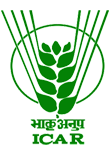- Five splits of nitrogen at 20%
basal, 25% at 4- leaf stage, 30% at 8- leaf stage, 20% at tassel emergence and
remaining 5% at early grain filling stage is best nitrogen utilization, higher
yield and net returns.
- Maize-wheat–mungbean/cowpea
cropping system is suitable for improvement of organic carbon, available N and
available P in zero tillage than conventional tillage.
- Intercropping of two rows of
groundnut in paired row maize (45/90 cm) is more profitable compared to
intercropping of mungbean, urdbean, cowpea and soybean.
- The
optimum plant population for rabi
maize is 80 thousands/ha and row distance is 60 cm with 150 kg N, 60 kg P2O5
and 40 kg K2O/ha for productivity optimization.
- In
spring season, application of rice straw mulch @ 5 t/ha after 2nd
irrigation is effective in increasing productivity, net return and irrigation
water use efficiency.
- Raised
bed with or without residue conservation is better than conventional tillage
method on Mollisols of tarai region
in maize
- Continuous
application of recommended dose of N, P and K through chemical fertilizers
along with farm yard manure 5 t ha-1 increases productivity and
nutrient uptake by maize and wheat, increases soil organic carbon and
sequestration and maintaining soil health in maize-wheat rotation in mollisols.
- Bacterial
stalk rot of maize can be managed efficiently by soil application of bleaching
powder @ 25 kg/ha at the time of flowering followed by second application after
10 – 12 days. Through irrigation water, bleaching powder (3%) @ 16.5 kg/ha at
the time of disease appearance or at flowering is recommended for BSR.
- For the
management of Brown stripe downy mildew, 4 – 6 foliar spraying of mancozeb
(0.3%), Captan (0.2%) at 7 to 10 days intervalor three foliar spray of Zinc Sulphate + Lime
(0.5% + 0.25%) and Copper sulphate (0.1%) at 7 days interval. Seed treatment
with Metalaxyl 35% WS @ 7 gm/kg seed followed by foliar spray of mancozeb 75%
WP or Metalaxyl 8% + Mancozeb 64% WP @ 2 – 2.5 kg/ha is also effective for managing Brown stripe downy mildew.
- Chopped green paddy stem with 10%
sucrose and peptone was found the best substrate for mass production of Rhizoctonia solani for artificial
inoculation under field conditions
- For
chemical management of banded leaf and sheath blight, two foliar spraying of
Propiconazole 25 EC/ Dinfenconazole 25 EC @ 0.1% at 10-15 days interval was found effective.
Newer compounds Pencycuran 250 SC @ 0.1% or Azoxystrobin 250 Sc @ 0.05%
was found effective for the management of BLSB. Soil application of Trichoderma
harzianum impregnated FYM @ 100kg/ha and seed dressing with the same @
2.5g/ka seed gave the highest disease control and yield.
- For
management of Post flowering of stalk rot seed treatment with Benlate (2 gm/kg
seed), drainage of water at the time of flowering and irrigation in case of
moisture stress was found effective in minimizing the disease incidence.
- For the
management of Maydis leaf blight two spraying of mancozeb 75WP or Zineb 75WP @
2 – 2.5 kg/ha at 10 to 15 days interval is recommended.

